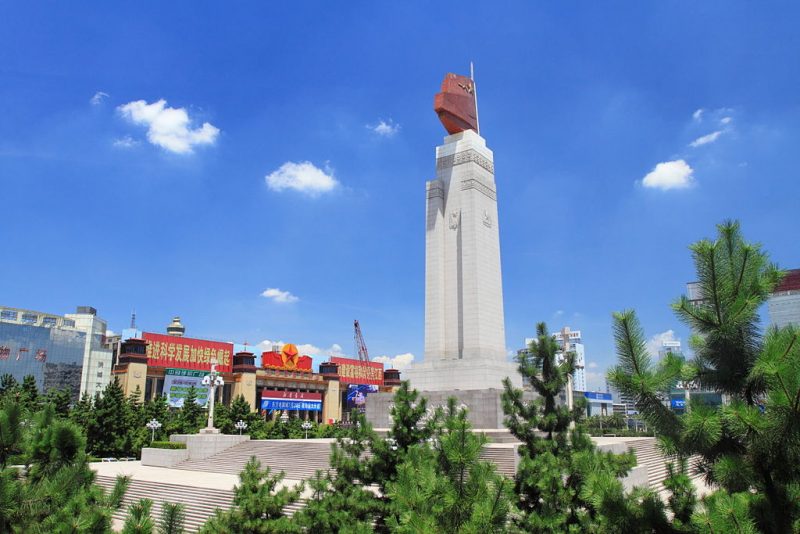
By U.S. Department of Homeland Security (DHS) – Public Domain, https://commons.wikimedia.org/w/index.php?curid=98666124
On Jan 6, 2021, the United States of America experienced her darkest moment ever since 9/11. At around 2 p.m, hundreds of Trump supporters, who firmly held the belief that Trump’s 2020 election victory was stolen, breached the Capitol seeking to stop the vote counting process in the Senate chamber. A shirtless rioter with a horned helm posing on the seat of the VP caught everybody’s attention. This marks the first time for the Capitol building to be overtaken ever since the war of 1812 against the British.
While the entire world was shocked by such an event, the spokesperson of the Chinese Ministry of Foreign Affairs (MFA) Chunying Hua, mocked the chaotic scene inside the Capitol building and deemed it to be “The most beautiful sight to behold”, in reference to a comment made in 2019 by Nancy Pelosi, which was made to extol the Storming of the Legislative Council (LegCo) of HongKong in the same year. While Hua’s rhetoric is predictable given the deteriorating Sino-US relationship, it does point to an important question: what is the difference between the two historical events?
On the surface, there is a certain degree of visual parallel. First of all, the two locations are remarkably the same. Second, the people who are involved are directly defying authority. The Chinese government has repeatedly argued that all forms of defying authority are bad, especially the violent ones, therefore justifying immediate response from the proper authorities. This is the logic the government uses to justify their response all over the country, most recently in Hong Kong and XinJiang.
Admittedly, I’m not a student of political science. My knowledge about the terminologies is lacking. But it seems to me that the argument is flawed on two accounts. One is hypocrisy. Let’s not forget that the ruling Chinese Community Party itself also started in open rebellions against the then authority KMT. The city of Nanchang, where the first armed rebellion occurred, still bears the title of “Heroic City” from the official. If defying authority is bad now, why was it good then? The other one is practicality. As a HK pro-democracy protester, there is no other means left but resorting to the streets and fighting with your bare hands at times like these. All the peaceful ways such as fair elections have been blocked by Beijing. Plus, HK police was not shy of using force either. How can anyone with a slice of practical understanding of the situation accuse HK protesters for not being peaceful, while turning a blind eye on the reckless wrongdoing of the police?

Zhangzhugang, CC BY-SA 4.0 https://creativecommons.org/licenses/by-sa/4.0, via Wikimedia Commons
So, if we cannot just disqualify the Storming of HK LegCo on the account of defying authority with violence, what makes us think this is good while what Trump rioters did in the Capitol was bad? The answer, in my opinion, is that HK under China is not a democracy, whereas the US still is. In a functional democracy, we have a constitution that counts. A constitution serves as a covenant between the people and the government. In particular, we define an orderly way to transfer power, as well as an orderly way to manage controversy. Mr. Trump has his full rights to reject the election result. He and his team just need to file lawsuits. Up until now, everything has been permitted by the Constitution. However, inciting supporters to storm the Capitol in a bid to overturn the lawful process is not only irresponsible as was his countless words and actions in the past, but also fundamentally breaks the covenant. Going back to HK, there is no double binding covenant whatsoever between the ruler and the ruled. The Basic Law is no more than a decree made by a medieval king to his subjects. People have to fight for their freedom when there is no democracy. Democracy, yes, is the difference between the Capitol in the US and LegCo in HK.
Can we use this argument to refute Ms Hua and her believers effectively? Probably not. Among many reasons, it is hard to argue that the US is a beacon of democracy any more. The freshest evidence being the historical riot that took place on Jan 6th, 2021 and countless more can be found within the last four years and beyond. However, a strong power of democracy is open dialogue, which enables reflection and improvement. May we see the day that democracy shines on both the Capitol and the LegCo, when there is no need to write this article.





Be First to Comment